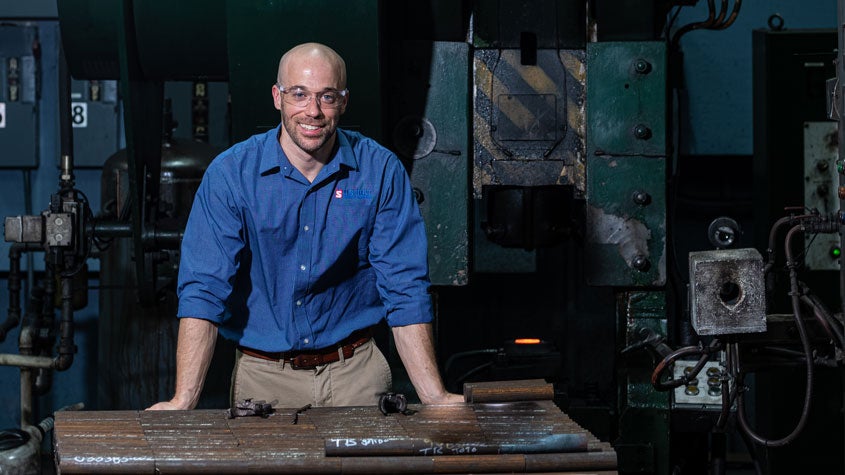In Brian Kingsley’s business they call it bolting, but the bolts his company manufactures can be six feet long and weigh as much as 600 pounds.
“We make anything that is a mechanical fastener with threads," said Kingsley, manager of quality and process engineering at U.S. Bolt Manufacturing, Inc. in Houston. "We manufacture engineered bolting for hostile environments and safety-related applications, primarily in critical subsea oil and gas drilling and production equipment."
Kingsley earned his professional master’s degree in materials science and nanoengineering (MSNE) from Rice University in 2015. He attended classes part-time while working full-time for U.S. Bolt, and completed his degree in two and a half years. Of the 75 employees in the company, 45, including fellow engineers, report to him.
“I think that graduating from Rice represents my best achievement," he said. "It taught me what I was capable of doing."
In 2008, Kingsley earned a B.S. in materials science and engineering from the University of Connecticut. He hadn’t always wanted to be an engineer and struggled for direction during his freshman year.
“I kind of floundered a lot,” he said. “I didn’t know what I wanted to do.”
At the suggestion of friends, Kingsley signed up for the engineering curriculum at UConn in his sophomore year, and committed to materials science after learning about the use of composite materials in the manufacturing of snowboards.
“A professor mentioned that materials scientists put together those composites," he said. "That sealed the deal for me."
Kingsley went to work for U.S. Bolt in 2008 as a lab metallurgist and was promoted to process engineer, then to quality manager and most recently, shortly after graduating from Rice, to manager of process engineering and quality.
U.S. Bolt manufactures what Kingsley describes as “handmade bolting.” Their plant, located near Reliant Stadium, is equipped for forging, heat treatment, machining, thread rolling, testing and inspection.
“We produce some products that aren’t available anywhere else," he said." We work in a really specific niche."
Every part manufactured by U.S. Bolt is customized for a specific job. They make forged fasteners, hex-head bolts and screws, 12-point flanges, hex flanges, socket caps, hex nuts, all-metal lock-nuts, all-thread studs, tap-end studs – the small but essential fittings that keep the oil and gas industry running.
Kingsley oversees cooperative testing initiatives between U.S. Bolt and other companies to further the metallurgical understanding of alloys used in adverse conditions. A recent project involved the fine-tuning of 718, a nickel-chromium-based super-alloy. It’s strong and corrosion-resistant, and can be heat-treated to various levels of strength. One byproduct of oil and gas production is hydrogen sulfide, a highly corrosive substance.
“You want the piece to resist corrosion but that tends to result in brittleness, so you have to deal with that. Brittling is always a problem. It was a project that actually went somewhere,” he said.
At Rice, Kingsley worked most closely with his graduate adviser, Jun Lou, professor of MSNE and associate department chair. He took Lou’s “Mechanical Properties of Materials” class and completed two research projects under his supervision.
Along with advancing his technical knowledge, Rice helped Kingsley become a better manager through the lessons he learned while taking “Leadership Coaching for Engineers” through the Rice Center for Engineering Leadership.
“The timing of the course couldn’t have been better,” he said. “I had just become the manager of a team of engineers and was struggling to manage technical personnel. Nearly every week, the topic taught in class had direct applicability to an issue I was trying to tackle with my engineering team that same week.”
To further his engineering career, Kingsley is studying for his Professional Engineer license exam in October while overseeing the addition of a coating facility to U.S. Bolt.
“I think that graduating from Rice represents one of my best achievements," he said. "It taught me what I was really capable of and made me much more confident and skilled as an engineer."

